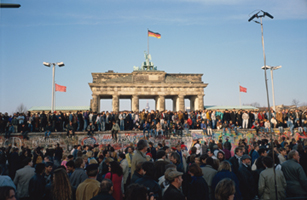
Reunion time As the border fell, people poured through
(3 of 3)
Delayed Reaction
On the Leipziger Strasse, which amounted to a showy shopping street by East Berlin's standards, two girls with straggly mid-seventies hairstyles were languidly looking in the shoe-store windows. I ran up to them. "The border's open!" I cried. One shrugged. The other returned to looking at imported stilettos. "She's not quite right in the head," was the last I heard as they ambled off. Brinkmann puffed along, his camera at the ready; I heard his mounting desperation as the first Ossis at the Wall's opening stubbornly refused to take it in. "For God's sake," he cried, "can't you just cheer or something?"
The guards were, as usual, distant, sitting high up in their bulletproof boxes. I tried again. "The border's open!" No response. "Herr Schabowski just announced it!" "Well it was still closed a minute ago," snapped his colleague, incontrovertibly. They had "no instructions" and no one had seen the television broadcast. Pending further instructions, etc., etc., I should remove myself immediately from the secure zone. So ended my attempt to breach the Berlin Wall. I hung around and watched a younger guard slip away, a radio to his ear. He gave a little impromptu jig and then straightened his jacket and went back into his box. This was Prussia, after all.
Within hours, the mass of people streaming toward the border crossings had reached such proportions that the Wall had to be opened, which it was, before midnight. Some time later, I sought out Schabowski, who lived in a rather natty apartment by the Spree with his Russian wife Irina and a parrot. "Really, it was a slip of the tongue," he confessed. "When I said 'immediately' I meant that people would present themselves with ID at post offices and form a queue. This was the GDR: it was the only way we could envisage doing anything!" Was there no anger from Schabowski's colleagues for his fateful mistake? "Well, a bit," he recalled. "But then, all things considered, you could say we were all in the s___ together. The only choice was to open up the pressure cooker, or watch it explode."
One People
After dark, Germans poured through the wall, the first still in their nightclothes, sleepwalkers
into history. Ten thousand of them partied and hammered, or simply looked around dazed at the strange new world without the Thousand-Year Wall. The next night, the bulldozers began to move in and the opening became official. I watched it happen in the Bornholmer Strasse, a checkpoint in a suburb near my flat. It had the feel of a neighborhood party, with housebound grandmothers shouting down from the tenements, "Bring me a piece of the Wall up, son!" as if calling for an apfelstrudel, and separated families meeting again. When the first chunks of the Wall came flying out, one hit my eye and dislodged my contact lens. (That enabled a claim to my managing editor for "Lost contact lens, due to falling Berlin Wall.") Someone brought out glasses and vodka, with chunks of the Wall's concrete instead of ice in the drinks. Twenty years on, I know a night out doesn't get any better than this.
I would go on to cover the more punitive mood towards East Germany's Stasi oppressors; the unending saga of complicity and blame; the arrival of the deutsche mark and the transition from "We are the people" to "We are one people," as unification became inevitable. It was the birth of a different Europe, free of old divisions and shackles, and one still coming to terms with its variety and responsibility even now. That's the big picture we'll be marking this year. Yet it's the details that stay freshest in the mind from the autumn that changed the world. One of the great happinesses of my life is that when people ask me, "Where were you in 1989?" I can just say: "I was there."
McElvoy, a former foreign correspondent, is political columnist of the London Evening Standard